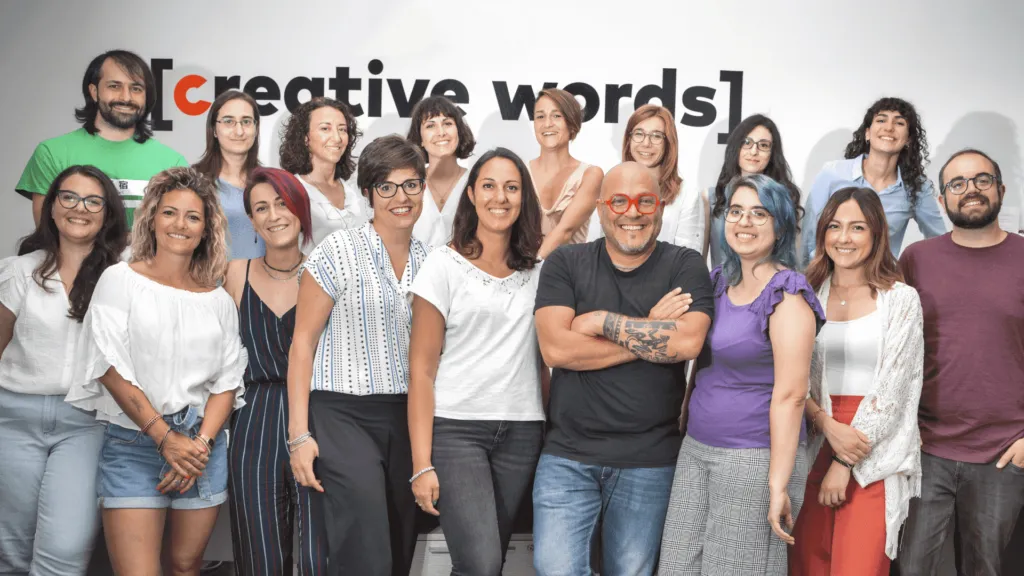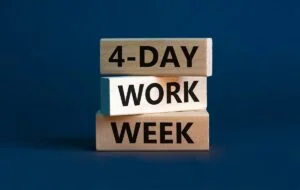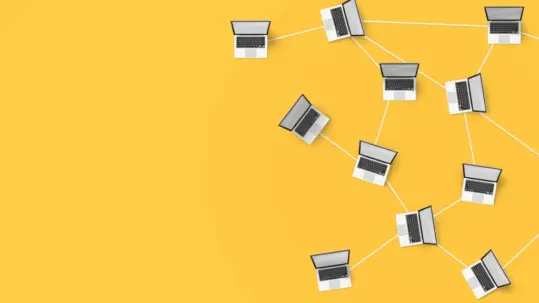
23 Sep The short work week: not an option, but a choice at Creative Words
HERE’S THE AUDIO VERSION OF THIS BLOG POST, ENJOY LISTENING!
How can a short work week increase team productivity?
Working to live and not living to work.
If we’re lucky (and also a bit good at it), we enjoy the work we do so much that we’re hardly ever affected by fatigue or the burden of routine. It becomes an aspect of our being, a key component of our personality: we are elevated by the work because it represents a channel for expressing our worldview, to give form, whether concrete or abstract, to our ideas and possibly even make a positive contribution to society. Yet reality may not always mirror imagination and be seen through the lens of romantic dreamers. Indeed, whether due to necessity or sudden changes in course, our work may sometimes not be exactly what we would have dreamed or expected; because of this, we don’t feel as fulfilled as we’d like.
Everyday life thus slowly passes to become a kind of monotonous and suffocating cage from which we find ourselves watching life go by. So it’s not surprising that many people Google which country to live in to work fewer hours and have more “rest” days: when work is oppressive, all you have left is to tightly cling to free time.
Whether the former case or even more so the latter, it’s still essential to always keep a sort of guideline in mind, an indispensable rule: to draw a thick, clear line between work life and personal life.

Yet what might seem like a simple plan to implement often hides pitfalls. If we’re passionate and motivated in our work, devoting more time to it will come almost naturally, while if we work for the mere necessity of earning money, getting out of the monotonous work routine will prove to be no small effort. And so overtime, whether actual or only a mental sensation, will continue to relentlessly multiply, inevitably corroding all the remaining parts of our lives.
Well, we can’t let that happen. We can’t allow the existence of a word like “karoshi“, which in case you didn’t know is a Japanese term used to refer to death from “too much work”. There’s no doubt that Japan has a different cultural approach to work that’s extremely stricter with much more intense rhythms, but can we easily claim that our situation is so different? That the line drawn is not thin if not, even worse, dashed?
So how can we change directions and give personal life the space it deserves?
The short work week: countries that have already understood its benefits
Many different solutions can be pursued, but it seems that one of them is starting to gain more and more momentum: the short work week. This is a different organisation of the amount of working hours, which is spread over four instead of five days. In some cases, the short work week involves a reduction in the number of hours, while in others simply a “compression” over fewer days. This new way of viewing and structuring work is slowly and increasingly spreading, from European countries to the indefatigable Japan (though only in a few isolated cases). A steadily growing number of employers and employees are experiencing this new reality and enjoying all the (studied and confirmed) benefits that come with it.
In fact, as the first test conducted between 2015 and 2019 in Iceland has already shown, there are many benefits to the short work week which have a profound impact on workers’ mental and physical well-being.
These include key factors such as:
- greater serenity;
- increased productivity from a work perspective as well;
- greater equity in the workplace;
- drastic decrease in stress;
- decreased incidents of burnout;
- decreased environmental impact and emissions.
This list is clearly quite significant. Indeed, the positive aspects of the short work week not only impact individuals, but also the entire work context, and more broadly the environment as well: more free time available to devote to a person’s loved ones and passions leads to being more serene and, consequently, also more motivated and productive in the workplace.
Therefore, an employer who adopts the short work week has the opportunity to be surrounded by people who are visibly more satisfied and who, among other aspects, also perform more.
Two further elements, especially nowadays, require attention: greater equity and reduced environmental impact. Dwelling on the first aspect, we see that the short work week allows to better organise family and work life, so that neither has to be sacrificed for the other. Environmentally, on the other hand, the short work week equals less home-work commutes by vehicles, and therefore less CO2 gas emissions. At the same time, depending on how the short work week is set up, it may also amount to lower energy consumption.
It is not difficult to understand why more and more countries are adopting this new method, which has all the makings of being revolutionary: Iceland, Belgium, Japan, Scotland, and now the United Kingdom with the impressive project of the NGO “4 Day Week Global“, founded by Andrew Barnes.
Why is it still hardly applied in Italy?
There are many sceptics of the short work week in a climate where the quantity of hours worked is always put before quality and the primary goal remains to produce as much as possible (a goal that is not exactly being achieved by the way, since Italy certainly doesn’t stand out among the European countries with the highest productivity). Some initial doubt is more than understandable, especially considering the organisational changes that will need to be addressed, but why deprive a company of something that could be an excellent opportunity? Simply put aside all kinds of preconceptions, have some courage (accompanied, of course, by the right lucidity) and give it a try.
In the worst-case scenario, if the outcome is not satisfactory for either the employer or the employees, a more traditional approach can always be returned to. The upside, however, is a “healthier”, more relaxed and efficient work environment.
In this hesitant and vaguely static landscape, there are of course exceptions. Starting in October, one of these will be Creative Words itself.
This new landscape, which we decided to begin with a six-month test, fully encapsulates our core values: understanding and helping each other, a constant desire to learn, and courage in taking on new challenges.

Change has never frightened us; on the contrary, it has always been a very important push for us to be able to evolve and to further improve ourselves. We not only mean an increase in innovation and expertise by this, but clearly also a work environment in which collaboration and balance are further strengthened.
For a company like ours which has made creativity one of its cornerstones, the incentive to indulge and nurture one’s passions is a fundamental aspect to be protected as much as possible.
Doing so results in calmer, more focused minds and, hand in hand, an even more energetic and enthusiastic attitude towards the work itself. In short, all the prerequisites for it to be a “win-win situation” in which all parties benefit.
That is why we have – and are still – working with an open and attentive mind to ensure that the short work week means greater general well-being and simultaneously even greater quality in our services. The whole team is looking forward to this new adventure, which we are sure will bring us great satisfaction.
Stay updated and contact us for more information!

Lara Panicucci (Marketing team Intern at Creative Words)
Translator (and, ideally, bookseller) wannabe, she dreams a life between pages and words. Some would say, and probably already did, that she is like as an “autumn evening” (“Doctor Zhivago”). Note that she is also a world champion of dunking biscuits into hot tea.





